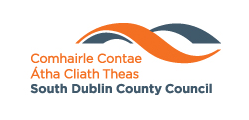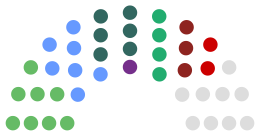South Dublin County Council
South Dublin County Council (Irish: Comhairle Contae Bhaile Átha Cliath Theas[1]) is the authority responsible for local government in the county of South Dublin, Ireland. It is one of three local authorities that comprised the former Dublin County Council before its abolition and one of four councils in the Dublin Region. As a county council, it is governed by the Local Government Act 2001. The council is responsible for housing and community, roads and transportation, urban planning and development, amenity and culture, and environment. The council has 40 elected members. Elections are held every five years and are by single transferable vote. The head of the council has the title of Mayor. The county administration is headed by a Chief Executive, Daniel McLoughlin. The county town is Tallaght, with a civic centre at Monastery Road, Clondalkin.[2] It serves a population of approximately 192,000.
South Dublin County Council Comhairle Contae Bhaile Átha Cliath Theas | |
|---|---|
 | |
| Type | |
| Type | |
| Leadership | |
Ed O'Brien, FF | |
| Structure | |
| Seats | 40 |
 | |
Political groups |
|
| Elections | |
Last election | 24 May 2019 |
| Meeting place | |
.jpg) | |
| County Hall, Tallaght | |
| Website | |
| sdcc | |

The council is the third largest local authority in Ireland with a population of 265,205 (Census 2011), 90,000 households, and 6,000 businesses, covering an area of 222.74 square kilometres.[3][4] There are 183,336 local government electors and 174,349 Dáil electors registered to vote in the County Council administrative area.[5]
History
The county council initially met in the Regional Technical College, Tallaght.[6] A new building, County Hall, was purpose-built for the county council and was completed in 1994.[7]
Legal status
The Local Government Act 2001 established a two-tier structure of local government. The top tier consisted of 29 county councils and five city councils. The bottom tier consisted of town councils. The Local Government Reform Act 2014 abolished this two-tier structure in favour of city councils, county councils and two hybrid councils, dubbed City and County Councils (Limerick and Waterford). South Dublin County Council gained an additional 14 seats due to this re-structuring.
The Local Government Act 1994 defines how an authority may act.[8] The local authority may provide,
- amenities, facilities and services related to:
- artistic and cultural activities,
- sports, games and similar activities,
- general recreational and leisure activities,
- civic improvements,
- environmental and heritage protection and improvement, and
- the public use of amenities.
It may also act as a library authority.
Governance
Management
The Corporate Policy Group (CPG) consists of the Mayor together with the Chairs of each of the Strategic Policy Committees (SPC). The CPG is supported by the County Manager.[9] Its function is to co-ordinate the work of the Committees so that policy decisions can be discussed and agreed for recommendation to the full council. "The CPG acts as a sort of Cabinet for the council and is supported by the County Manager."[10]
Mayor and Deputy Mayor
The Mayor and Deputy Mayor are chosen from among the councillors.[11]
Councillors
For the purpose of elections the county is divided into seven local electoral areas, each of which elects between five and seven councillors.
| Area | Seats |
|---|---|
| Clondalkin | 7 |
| Firhouse–Bohernabreena | 5 |
| Lucan | 5 |
| Palmerstown–Fonthill | 5 |
| Rathfarnham–Templeogue | 7 |
| Tallaght Central | 6 |
| Tallaght South | 5 |
2019 seats summary
| Party | Seats | |
|---|---|---|
| Fianna Fáil | 8 | |
| Fine Gael | 7 | |
| Sinn Féin | 6 | |
| Green Party | 4 | |
| Solidarity–PBP | 3 | |
| Labour Party | 2 | |
| Social Democrats | 1 | |
| Independent | 9 | |
Councillors by electoral area
This list reflects the order in which councillors were elected on 24 May 2019.[12]
†Replaced during term, see table below for details.
Co-options
| Party | Outgoing | Electoral area | Reason | Date | Co-optee | |
|---|---|---|---|---|---|---|
| Sinn Féin | Mark Ward | Palmerstown–Fonthill | Elected as a TD for Dublin Mid-West in the 2019 by-election. | November 2019 | Lisa Colman [13] | |
| Green Party | Francis Noel Duffy | Firhouse–Bohernabreena | Elected as a TD for Dublin South-West in the 2020 general election. | February 2020 | Clare O'Byrne | |
| Fine Gael | Emer Higgins | Clondalkin | Elected as a TD for Dublin Mid-West in the 2020 general election. | February 2020 | Shirley O'Hara | |
| Fine Gael | Mary Seery Kearney | Rathfarnham–Templeogue | Nominated by the Taoiseach to Seanad Éireann | June 2020 | TBA | |
Polling scheme
For administrative and electoral purposes, the county council organises Dublin South into a hierarchy of electoral units. These are: Local electoral areas, Polling Districts, District electoral divisions, Townlands, and Polling Places for voting. This hierarchical structure is called a polling scheme. The most recent polling scheme was adopted by the county council on 13 September 2010 and went into operation on 15 February 2011.[14]
There are four Dáil constituencies in the county:
and seven Local electoral areas:
- Clondalkin
- Firhouse-Bohernabreena
- Lucan
- Palmerstown-Fonthill
- Rathfarnham-Templeogue
- Tallaght Central
- Tallaght South
The constituencies and electoral areas are organised as follows:
- Dublin Mid-West constituency contains local electoral areas Clondalkin, Lucan and Palmerstown-Fonthill
- Dublin South contains Rathfarnham-Templeogue and Firhouse-Bohernabreena
- Dublin South-Central contains Rathfarnham-Templeogue
- Dublin South-West contains Tallaght Central, Tallaght South, Firhouse Bohernabreena and Rathfarnham-Templeogue
Some overlaps occur: Rathfarnham-Templeogue local electoral area occupies parts of three constituencies: Dublin South, Dublin South-Central and Dublin South-West. Firhouse-Bohernabreena local electoral area occupies parts of two constituencies: Dublin South-Central and Dublin South-West.
The following tables illustrate the detailed administrative-electoral county structure, or polling scheme:[15]
Polling Scheme (Pre-2019) | ||||||||||||||||||||||||||||||||||||||||||||||||||||||||||||||||||||||||||||||||||||||||||||||||||||||||||||||||||||||||||||||||||||||||||||||||||||||||||||||||||||||||||||||||||||||||||||||||||||||||||||||||||||||||||||||||||||||||||||||||||||||||||||||||||||||||||||||||||||||||||||||||||||||||||||||||||||||||||||||||||||||||||||||||||||||||||||||||||||||||||||||
|---|---|---|---|---|---|---|---|---|---|---|---|---|---|---|---|---|---|---|---|---|---|---|---|---|---|---|---|---|---|---|---|---|---|---|---|---|---|---|---|---|---|---|---|---|---|---|---|---|---|---|---|---|---|---|---|---|---|---|---|---|---|---|---|---|---|---|---|---|---|---|---|---|---|---|---|---|---|---|---|---|---|---|---|---|---|---|---|---|---|---|---|---|---|---|---|---|---|---|---|---|---|---|---|---|---|---|---|---|---|---|---|---|---|---|---|---|---|---|---|---|---|---|---|---|---|---|---|---|---|---|---|---|---|---|---|---|---|---|---|---|---|---|---|---|---|---|---|---|---|---|---|---|---|---|---|---|---|---|---|---|---|---|---|---|---|---|---|---|---|---|---|---|---|---|---|---|---|---|---|---|---|---|---|---|---|---|---|---|---|---|---|---|---|---|---|---|---|---|---|---|---|---|---|---|---|---|---|---|---|---|---|---|---|---|---|---|---|---|---|---|---|---|---|---|---|---|---|---|---|---|---|---|---|---|---|---|---|---|---|---|---|---|---|---|---|---|---|---|---|---|---|---|---|---|---|---|---|---|---|---|---|---|---|---|---|---|---|---|---|---|---|---|---|---|---|---|---|---|---|---|---|---|---|---|---|---|---|---|---|---|---|---|---|---|---|---|---|---|---|---|---|---|---|---|---|---|---|---|---|---|---|---|---|---|---|---|---|---|---|---|---|---|---|---|---|---|---|---|---|---|---|---|---|---|---|---|---|---|---|---|---|---|---|---|---|---|---|---|---|---|---|---|---|---|---|---|---|---|---|---|---|---|---|---|---|---|
| ||||||||||||||||||||||||||||||||||||||||||||||||||||||||||||||||||||||||||||||||||||||||||||||||||||||||||||||||||||||||||||||||||||||||||||||||||||||||||||||||||||||||||||||||||||||||||||||||||||||||||||||||||||||||||||||||||||||||||||||||||||||||||||||||||||||||||||||||||||||||||||||||||||||||||||||||||||||||||||||||||||||||||||||||||||||||||||||||||||||||||||||
Controversies
2019 Wetlands Destruction
In 2019, South Dublin County Council sanctioned the mass dumping of silt in a wetlands park which it had previously vowed to protect.[16][17] A large part of the park's ecosystem was destroyed, buried under several feet of silt which was then leveled with heavy machinery.[18] The destruction enraged environmental groups, who estimated that thousands of animals were buried and killed, including several protected and endangered species.[16][18] In response, the council confirmed that they would review their silt disposal process,[16] while admitting no wrongdoing.[17]
References
- "Local Government Reform Act 2014". Irish Statute Book. Retrieved 5 November 2015.
- "Opening Hours & Useful Addresses". South Dublin County Council. Retrieved 15 February 2011.
- "Corporate Plan 2010–2014". South Dublin County Council. Retrieved 15 February 2011.
- "Census 2006 – Population of each province, county and city". Central Statistics Office. Archived from the original on 17 April 2011. Retrieved 15 February 2011.
- "Register of Electors". South Dublin County Council. Retrieved 15 February 2011.
- "Two councillors served on first South Dublin County Council 25 years ago". The Echo. 4 June 2019. Retrieved 1 November 2019.
- "From Monastic Centre to Modern City" (PDF). South Dublin County Council. p. 2. Retrieved 1 November 2019.
- "Local Government Act 1994, Section 31". Irish Statute Book. Retrieved 15 February 2011.
- "Corporate Plan 2010–2014, page 32". South Dublin County Council. Retrieved 15 February 2011.
- "Council website – Corporate Policy Group". South Dublin County Council. Retrieved 15 February 2011.
- "Local Government Act, 2001: Cathaoirleach and Leas-Chathaoirleach". Irish Statute Book. Retrieved 17 February 2011.
Per Schedule 8 of the Local Government Act, 2001, the elected Members of the Council, in exercising their reserved functions, resolved at a Council Meeting held on 11 March 2002 to give to the office of the Cathaoirleach and Leas Chathaoirleach the titles of Méara (Mayor) and Leas Mhéara, (Deputy Mayor).
- "Local Elections 2019". Local Government. Retrieved 8 June 2019.
- "New Clondalkin Councillor appointed". News Group.
- "Polling Scheme 2010". South Dublin County Council. Retrieved 15 February 2011.
- "Adopted Polling Scheme 2010". South Dublin County Council. Retrieved 15 February 2011.
- https://www.rte.ie/news/dublin/2019/0923/1077684-tallaght-wetlands/
- https://www.thejournal.ie/wetlands-tallaght-south-dublin-county-council-4820913-Sep2019/
- https://www.irishtimes.com/news/environment/south-dublin-council-to-review-destruction-of-wetland-eco-system-1.4027496
External links
| County councils | |
|---|---|
| City councils | |
| City and County councils | |
| Acts | |
| See also | |